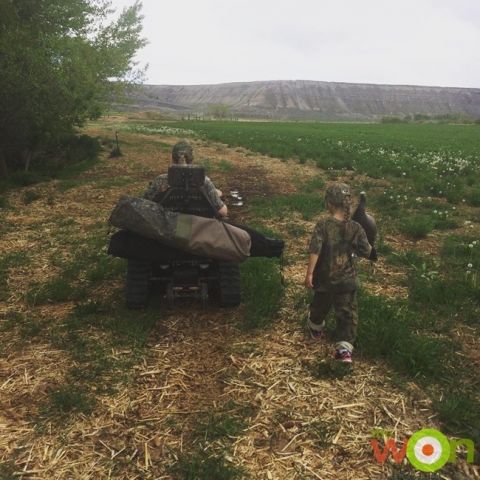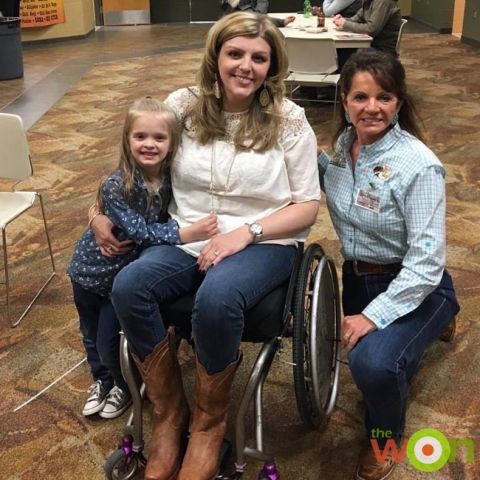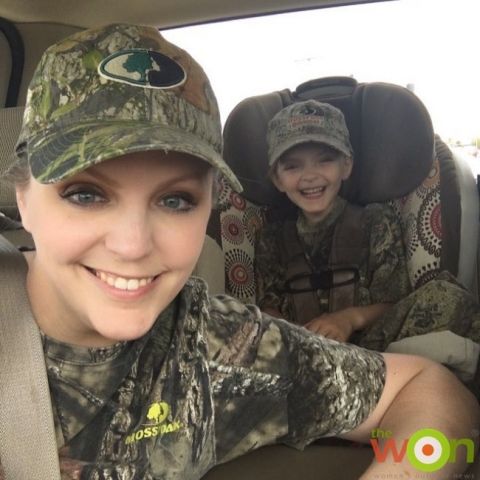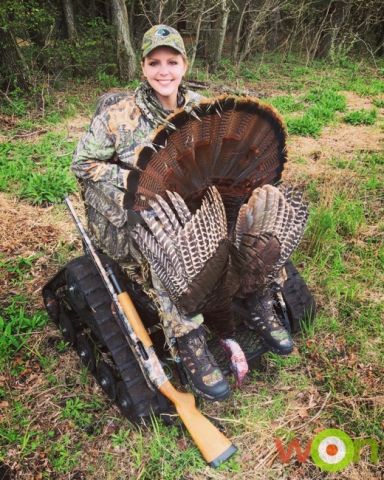My husband and I just started turkey hunting last year. We spend a lot of time pursuing large game in our home state of Wyoming, and our springs are usually filled with fly fishing, but I am always looking for new ways to enjoy the outdoors. When I found out that a girlfriend of mine who lives a few hours away had several birds on her cattle ranch, I called to see if it would be possible to learn what this turkey hunting business was all about.
We talked to a lot of turkey hunters, and spent hours reading articles online and in magazines. We borrowed some gear and purchased a decoy. Flambeau Outdoors sent me some calls (MSRP: $22.78), and we practiced around the house, to the chagrin of our young daughter. To be honest, we didn’t really know how accurate our calls sounded, as we’d only heard wild turkeys on TV and online videos. This was the least prepared I had ever felt going into a hunt. But at this point, we knew we just needed to get out there and be prepared to adapt in the field.
We headed to the ranch before the season opened to do some scouting and get the lay of the land. My friend pointed out several spots where she had seen the wild turkeys and assured us that there were gobblers on the property. We used the daylight to plan, as we would be coming in before sunrise, under cover of darkness. We decided to set up our blind near an opening in the woods where we thought the turkeys would pass on their way to the neighboring fields. It had great access for my Action Track Chair, and if we positioned the blind correctly, we would have multiple shooting lanes to be prepared for any approach.

In my Action Track Chair carrying the blind and chairs with Addison carrying the decoy.
Boy, did we learn a lot during those weekend hunts. It was fascinating how much it felt like elk hunting as we did our best to learn the language and behavior of the birds. We called in a few solo toms and saw plenty of hens, although I don’t know if it was the realism of our attempts or just curious birds trying to identify the strange noises they were hearing. We had a wonderful time as a family, and will definitely continue the adventure.
Anytime you pursue a DIY hunt in an unknown area searching for a new species, there is a huge learning curve. Throw in the intimidation of trying a tricky skill like turkey calling, and I can understand why some women are hesitant to try it—especially without an experienced turkey hunter as a companion. As I am a new turkey hunter, I reached out to someone who knows a thing or two about helping women learn more about pursuing turkeys, Brenda Valentine. Brenda is a National Spokesperson for NWTF, a member of Bass Pro Shop’s National RedHead Pro Hunting Team, and “The First Lady of Hunting.”

Meeting Brenda Valentine for the first time at the Wyoming Sportsmen’s Expo in Gillette, Wyoming.
As we discussed the best ways to encourage more women to try turkey hunting, Brenda observed, “New turkey hunters can be intimidated because you feel like you have to be an expert caller, but you can be skilled in a lot of other things and still be successful. Don’t let an inability to call like a champion keep you out of the woods. Good calling adds to the hunt, but it’s not the bottom line if you have developed other good hunting skills.” So how do we improve our success as a turkey hunter, and possibly work on our calling technique in the process?

Raising my daughter, Addison, to be a hunter.
Practice
As with most hunting adventures, being prepared goes a long way. Make sure that you’ve pattered your shotgun and that it is clean and in good working order. Know the difference in shell loads and what choke you have available for your gun.
If you want to improve your calling, you also have to practice. The first time I tried a box call, it sounded like nails scraping down a chalkboard. I thought my family was going to make me move to the basement. So, I waited until I had the house to myself and started screeching away. It didn’t take long for me to realize that changing the speed of my movement, the pressure I placed on the paddle, and the rhythm I worked it with all brought about different sounds. To my surprise, after just a few minutes of practice, I started to get the hang of it, and I sounded more like a hen.
So I took my practice to the field. A blind in the woods was definitely a different environment from my bedroom at home, but my hands quickly remembered their job and I was able to produce the same sounds fairly consistently. Once I felt comfortable with the box call, I knew it was time to move on to more complex calls.
Try For Variety
It’s easy to stick to what you know, but to improve your skills, you need to branch out. Slate or pot calls also require two hands, but they are a little bit more difficult to master. With practice you can make a variety of sounds with your slate. And depending on the material the slate and striker are made from, you can have a variety of turkey sounds for every situation.
Mouth or diaphragm calls are efficient because they can be used hands-free, but they are also more difficult to operate. For some people (like me), they are nearly impossible. I have a horrible gag reflex, so having something in my mouth and attempting to manipulate said tool turns into a game of trying not to choke to death. The more I try, the better I am able to tolerate a mouth call, but for now, they are definitely my nemesis.
And that’s OK. There is a call out there for everyone—many more than I have mentioned here. You just have to find what works best for you if you are interested in improving your turkey talk. If calling isn’t for you, there are other options for successful turkey hunting.

First turkey harvest in Indiana with Turkey Tracks.
Utilize Decoys
I’d never used a decoy until we started turkey hunting. With so many choices flooding the market, if you don’t have enough experience to have an opinion, sometimes your budget can make the decision for you. We bought an inexpensive hen decoy (MSRP: $17.38) and borrowed a few toms from a friend and started learning. We placed decoys in different positions to simulate various scenarios and tried to use similar calls with each setup. It was a lot of fun—the turkeys either interacted with or completely ignored our efforts. And that led us to the best lesson of all.
Watch and Listen
Sometimes the best way to learn about hunting is to put down the shotgun and observe what’s going on around you. There is something awe-inspiring about hearing the turkeys begin their morning chatter as the sun rises. It can be magical to watch their interaction with each other and their surroundings. It’s easy to let nerves or excitement cause you to miss the moments that can teach you to be a better hunter. Next time you’re out in the woods, whether in hunting season or out, don’t forget to pay attention and appreciate the details.
At the end of the day, regardless of which call you use—or if you call at all—you have to take a chance to learn something new. If you have never tried turkey hunting and are interested, reach out to a friend or women’s program for ideas. Brenda suggests, “Recruit a mentor if possible; it makes the learning curve less steep.” Don’t let the seeming complexity of turkey calling intimidate you, and be brave enough to strike out on your own. At the very least, you’ll have a great day in the woods.
Ashlee Lundvall writes a blog titled "Redefining Life," that follows her rise from a debilitating injury as a teenager to Ms. Wheelchair USA in 2013. Her first book, "A Redefined Life," was published in February of 2016, and she is on National Pro Staff for Mossy Oak and the NRA’s Disabled Shooting Sports committee. Ashlee is also the recipient of the 2017 SCI Foundation Pathfinder Award. Ashlee truly shines as a keynote speaker at outdoor industry and disability related events and conferences. She is passionate about mentoring newly injured patients, and loves to pass on her love for adapted outdoor recreation! View all posts by Ashlee Lundvall
So happy to know this! Good luck and please … share your story with us!
I love hearing about moms and daughters going out hunting together- have a wonderful time of making memories!
Sounds like those flambeau outdoors MAD Boom box calls were successful for you! I love the sound of them. Have been using that company for calls for years.
Love this! I am so happy I found your site. Thank you for the advice and encouragement, my 13 year old daughter and I are going for the first time this April.